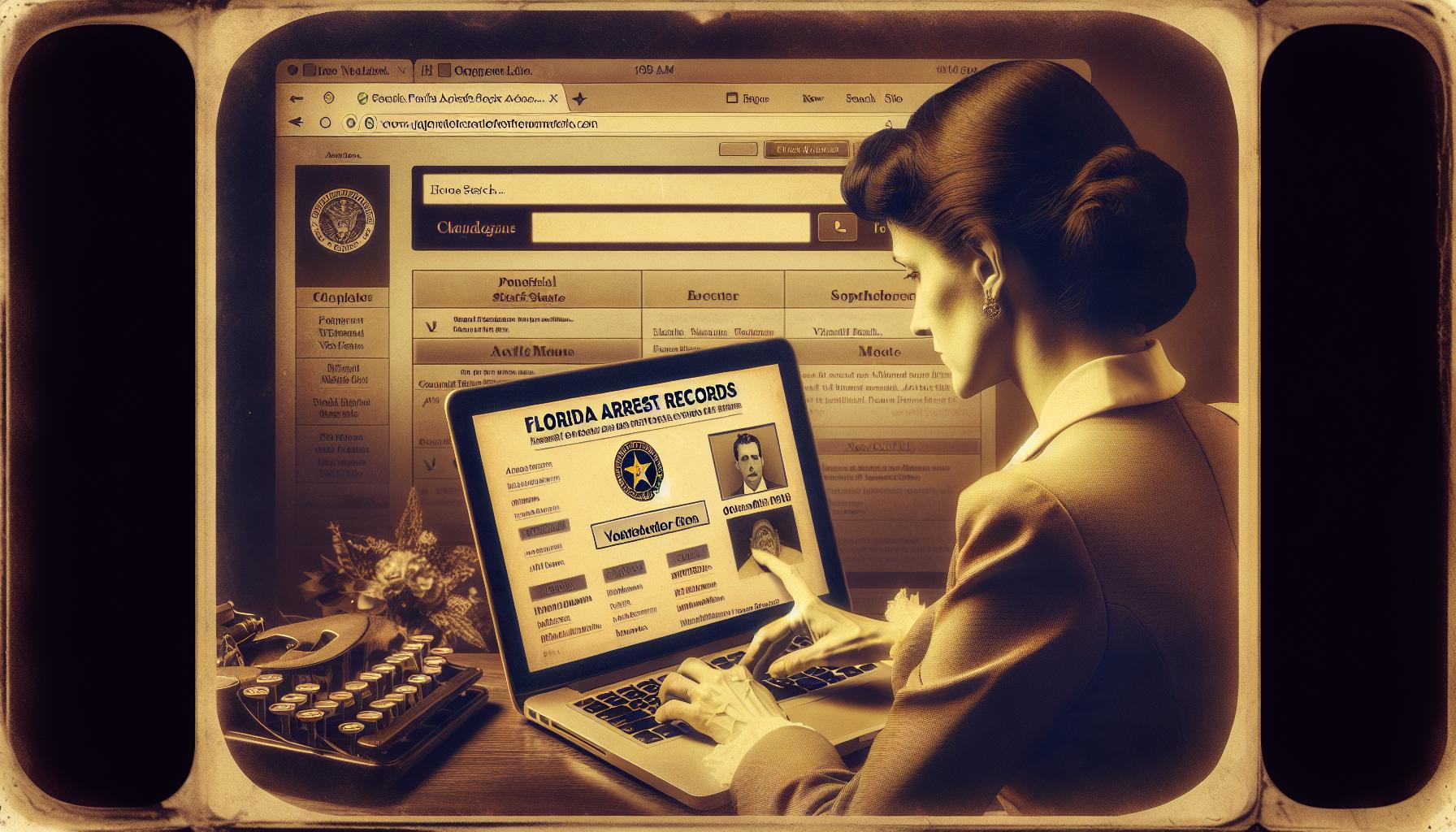Have you ever wondered about someone's criminal history in Florida? You're not alone. Many people seek access to arrest records for various reasons, from personal safety to background checks.
Florida's Sunshine Laws make it easier than ever to obtain public arrest records. These laws ensure transparency in government operations, including law enforcement activities. As a result, you can now access a wealth of information about arrests made throughout the state without costly fees or lengthy procedures.
In this article, we'll explore how you can obtain free public arrest records in Florida. We'll cover the available resources, the types of information you can expect to find, and the limitations you should be aware of when using these records.
Free Public Arrest Records in Florida
Florida's public records law, outlined in Florida Statute Section 943.053, makes most criminal records, including arrest records, accessible to the public. These records remain available unless they've been expunged or sealed.
Several free search options exist for accessing public arrest records in Florida:
- County Sheriff's Office Websites: Many Florida county sheriff's offices provide free arrest search features on their websites. For example, Hillsborough County allows searches by name, booking number, or booking date. The Broward Sheriff's Office offers searches using the suspect's first and last name.
- Local County Resources: Each county in Florida may maintain its own database for recent arrests. These resources often provide up-to-date information on local arrests without charge.
While these free options offer valuable information, they may have limitations in terms of the scope and depth of available data. More comprehensive searches might require additional steps or fees, depending on the specific information you're seeking.
How to Access Florida Arrest Records Online

You can access Florida arrest records online through official state websites and third-party platforms. Each option has its own advantages and limitations.
Official State Websites
The Florida Department of Law Enforcement (FDLE) serves as the central repository for criminal history information in Florida. You'll find various search options on their website, including Instant Search, Certified/Non-Certified Search, and ORI Search. Each search costs $24, plus a $1 credit card processing fee.
Many county sheriff's offices in Florida provide online search tools for arrest records. For example, the Hillsborough County Sheriff's Office and the Broward Sheriff's Office allow you to search for arrest records by name, booking number, or booking date. These county-level resources often offer free access to recent arrest information within their jurisdiction.
Third-Party Platforms
Several third-party platforms aggregate public records, including arrest records, from various sources across Florida. These platforms often provide a user-friendly interface and may offer additional features such as background checks or multi-state searches. However, the information provided by these platforms may not always be up-to-date or comprehensive, and some services may charge fees for detailed reports.
When using third-party platforms, verify their credibility and review their data sources to ensure you're receiving accurate and current information. Some reputable third-party platforms include:
- Intelius
- BeenVerified
- TruthFinder
- Instant Checkmate
Remember that while these platforms can be convenient, they may not have access to all official records, and the information they provide should be verified through official channels for legal or employment purposes.
Types of Information Available in Florida Arrest Records

Florida arrest records contain a wealth of information about individuals who have been arrested in the state. The data available in these records is comprehensive and covers various aspects of the arrest and the individual involved.
Personal Details
Florida arrest records typically include extensive personal information about the arrested individual. You'll find the person's full name, including any known aliases or nicknames. Date of birth, nationality, ethnicity, and sex are also standard inclusions. Additional biographical data such as height, weight, eye color, and hair color may be present, providing a complete physical description of the individual.
Arrest Information
Arrest records in Florida contain detailed information about the circumstances of the arrest. You'll find the date and time of the arrest, the specific charges filed, and the location where the arrest took place. These records often include the arresting agency and officer's name. If there were any outstanding warrants at the time of arrest, that information is typically included as well. Many county sheriff's office websites provide access to this information, including mugshots, charges, and case numbers, which you can search by name.
Case Disposition
The case disposition section of Florida arrest records provides information about the outcome of the arrest. You'll find details on whether the case went to trial, resulted in a plea bargain, or was dismissed. If there was a conviction, the record typically includes the sentence imposed, such as fines, probation, or incarceration. This section also contains information about any post-conviction actions, such as appeals or early release. The case disposition is crucial for understanding the final legal outcome of an arrest.
Benefits of Accessing Free Public Arrest Records
Free public arrest records in Florida offer several advantages:
Enhanced Public Safety: Access to arrest records allows you to stay informed about criminal activities in your area. You'll gain insights into local crime trends and potential safety concerns, enabling you to make informed decisions about your personal security.
Background Checks: These records serve as a valuable tool for conducting basic background checks. You can verify information about potential employees, tenants, or business partners without incurring costs associated with comprehensive background screening services.
Transparency in Law Enforcement: Free access to arrest records promotes transparency in the criminal justice system. You're able to monitor law enforcement activities and ensure accountability, supporting the principles of Florida's Sunshine Laws.
Personal Record Verification: If you've been arrested in the past, accessing these records allows you to verify the accuracy of your own information. You can ensure that the details on file are correct and take steps to address any discrepancies.
Research and Analysis: Researchers, journalists, and analysts can utilize these records for studies on crime patterns, law enforcement practices, and judicial system effectiveness without financial barriers.
Community Awareness: Free arrest records enable you to stay informed about incidents involving community members, local officials, or public figures, fostering a more aware and engaged citizenry.
Remember, while these benefits are significant, it's crucial to use this information responsibly and in accordance with legal and ethical guidelines.
Limitations and Restrictions of Florida Arrest Records

While Florida's public records laws provide broad access to arrest records, there are important limitations and restrictions to consider:
Public Access Restrictions
Florida Statute Section 943.053 ensures most criminal records are public, but this doesn't apply to all records. Arrest records that have been expunged or sealed aren't accessible to the public. This limitation protects individuals who've had their records legally removed from public view.
Juvenile Record Confidentiality
Arrest records for juveniles are confidential and have strict access restrictions. Only authorized persons can obtain these records, including:
- The subject of the record
- Their attorney
- Parent or legal guardian
- Approved criminal justice agencies
- Agencies responsible for employment, access authorization, or licensure decisions
This confidentiality protects minors and gives them a chance at rehabilitation without the stigma of a public record.
Access Fees
While the records are public, accessing them isn't always free. The Florida Department of Law Enforcement (FDLE) charges $24 per search, plus a $1 credit card processing fee. There's no provision for obtaining these records for free from the FDLE. This fee structure can limit access for those unable to afford the search costs.
Data Accuracy and Timeliness
Free public arrest records may not always provide the most up-to-date or comprehensive information. Delays in updating records or incomplete data transfers between agencies can result in inaccurate or outdated information. It's crucial to verify information from multiple sources for critical decisions.
Use Restrictions
While you can access these records, there are legal restrictions on how you can use the information. Using arrest record data for discriminatory purposes in housing, employment, or other areas can lead to legal consequences. Always ensure you're using the information ethically and in compliance with relevant laws.
Legal Considerations When Using Public Arrest Records
When accessing and using Florida's public arrest records, you must be aware of several legal considerations:
Privacy Rights and Restrictions
- Sealed or Expunged Records: These aren't publicly accessible and shouldn't be disclosed.
- Juvenile Records: Generally confidential, with access limited to authorized individuals.
- Victim Information: Certain details about crime victims may be protected from public disclosure.
Fair Use and Employment Practices
- Equal Employment Opportunity Commission (EEOC) Guidelines: Employers must follow EEOC rules when using arrest records in hiring decisions.
- Florida Civil Rights Act: Prohibits discrimination based on race, color, religion, sex, pregnancy, national origin, age, handicap, or marital status.
- Ban the Box Laws: Some Florida cities have adopted policies delaying criminal history inquiries until later in the hiring process.
Liability and Misuse
- Defamation: Publishing inaccurate arrest record information could lead to defamation claims.
- Fair Credit Reporting Act (FCRA): Applies when using arrest records for employment purposes, requiring consent and proper disclosure.
Data Accuracy and Currency
- Obligation to Verify: Users should cross-reference information with official sources to ensure accuracy.
- Time Sensitivity: Arrest records may not reflect current case status or final dispositions.
- Florida Sunshine Law: Grants broad access to public records but includes exemptions for certain types of information.
- Record Request Procedures: Follow proper channels and procedures when requesting arrest records from government agencies.
By understanding these legal considerations, you can use Florida's public arrest records responsibly and avoid potential legal issues.
Privacy Concerns and Data Protection

When accessing free public arrest records in Florida, it's crucial to understand the privacy implications and data protection measures in place. While these records are generally available to the public, there are safeguards to protect individuals' privacy and prevent misuse of sensitive information.
Florida's public records laws balance transparency with privacy protection. Here's what you need to know:
- Sealed and Expunged Records: These records are not accessible to the public, protecting individuals who have had their records legally sealed or expunged.
- Juvenile Records: Arrest records for minors are confidential and not available through public searches, safeguarding the privacy of young offenders.
- Victim Information: Details about victims of certain crimes, particularly those involving sexual offenses, are often redacted or withheld to protect their privacy.
- Data Accuracy: While free public arrest records are generally available, they may not always be up-to-date or accurate. It's essential to verify information through official sources, especially for legal or employment purposes.
- Personal Information Protection: Some personal identifiers, such as social security numbers, are typically redacted from public arrest records to prevent identity theft.
When using these records, consider the following data protection measures:
- Use reputable sources: Rely on official government websites or verified third-party platforms to access arrest records.
- Verify information: Cross-reference data from multiple sources to ensure accuracy.
- Respect privacy: Use the information responsibly and ethically, avoiding unnecessary disclosure of personal details.
- Understand legal restrictions: Be aware of laws governing the use of arrest records, particularly in employment decisions or public dissemination.
By adhering to these guidelines, you can access Florida's free public arrest records while respecting privacy concerns and data protection principles.
Alternatives to Free Public Arrest Records in Florida
While completely free methods for obtaining detailed public arrest records in Florida are limited, several alternatives provide access to this information at minimal cost or with some restrictions:
Sheriff's Office Websites
Local sheriff's office websites offer search features for arrest information:
- Hillsborough County Sheriff's Office
- Broward Sheriff's Office
These sites allow searches by:
- Name
- Booking number
- Booking date
You'll find basic arrest details such as:
- Mugshots
- Charges
- Case numbers
County Clerk of Court Websites
For more comprehensive information, including actual police reports, county clerk of court websites are valuable resources. While not free, these records are obtainable for a nominal fee.
Florida Department of Law Enforcement (FDLE)
The FDLE provides access to criminal history records. Each search costs:
- $24 for the search
- $1 credit card processing fee
| Service | Cost |
|---|---|
| FDLE Criminal History Search | $24 |
| Credit Card Processing Fee | $1 |
| Total | $25 |
These alternatives offer varying levels of detail and accessibility, providing options for those seeking Florida arrest records beyond free resources.
Conclusion
Free public arrest records in Florida offer valuable insights into local law enforcement activities and criminal histories. You have multiple options for accessing this information ranging from county websites to state databases. While these records provide transparency they come with limitations and legal considerations.
Remember to use this information responsibly respecting privacy rights and understanding potential inaccuracies. By leveraging these resources wisely you can stay informed about your community while navigating the complexities of public records access in Florida.
Frequently Asked Questions
What are Florida's Sunshine Laws?
Florida's Sunshine Laws promote transparency in government and law enforcement by making public records, including arrest records, easily accessible to the public. These laws ensure that most criminal records are available without significant costs or complicated procedures, unless they have been expunged or sealed.
How can I access free public arrest records in Florida?
You can access free public arrest records in Florida through several methods:
- County sheriff's office websites
- Local county resources
- Some third-party platforms
These options typically provide recent arrest information, but may have limitations on the scope and depth of available data.
What information is typically included in Florida arrest records?
Florida arrest records usually include:
- Personal details (full name, date of birth, nationality, physical description)
- Arrest information (date, time, charges, arresting agency)
- Case disposition (legal outcomes, trial results, plea bargains, sentencing details)
The level of detail may vary depending on the source and type of record accessed.
Are there any restrictions on accessing Florida arrest records?
Yes, there are some restrictions:
- Expunged or sealed records are not publicly accessible
- Juvenile arrest records are confidential
- Some records may require a fee to access
- Victim information may be redacted in certain cases
Always use the information ethically and in compliance with relevant laws.
Can I use Florida arrest records for employment purposes?
While arrest records are public, using them for employment purposes requires careful consideration:
- Comply with EEOC guidelines
- Follow the Florida Civil Rights Act
- Adhere to local "Ban the Box" laws
- Comply with the Fair Credit Reporting Act (FCRA)
Always verify information accuracy and consider the time sensitivity of arrest records.
Are there alternatives to free methods for obtaining Florida arrest records?
Yes, there are low-cost alternatives:
- County clerk of court websites (nominal fee for comprehensive information)
- Florida Department of Law Enforcement (FDLE) criminal history search ($24 plus $1 processing fee)
- Some sheriff's office websites offer more detailed searches for a small fee
These options often provide more comprehensive and up-to-date information than free resources.
How can I ensure the privacy and protection of data when accessing arrest records?
To protect privacy when accessing arrest records:
- Use reputable sources
- Verify information with official sources
- Respect individual privacy rights
- Understand and follow legal restrictions
- Don't share or publish sensitive information without proper authorization
Always prioritize ethical use and data protection principles.